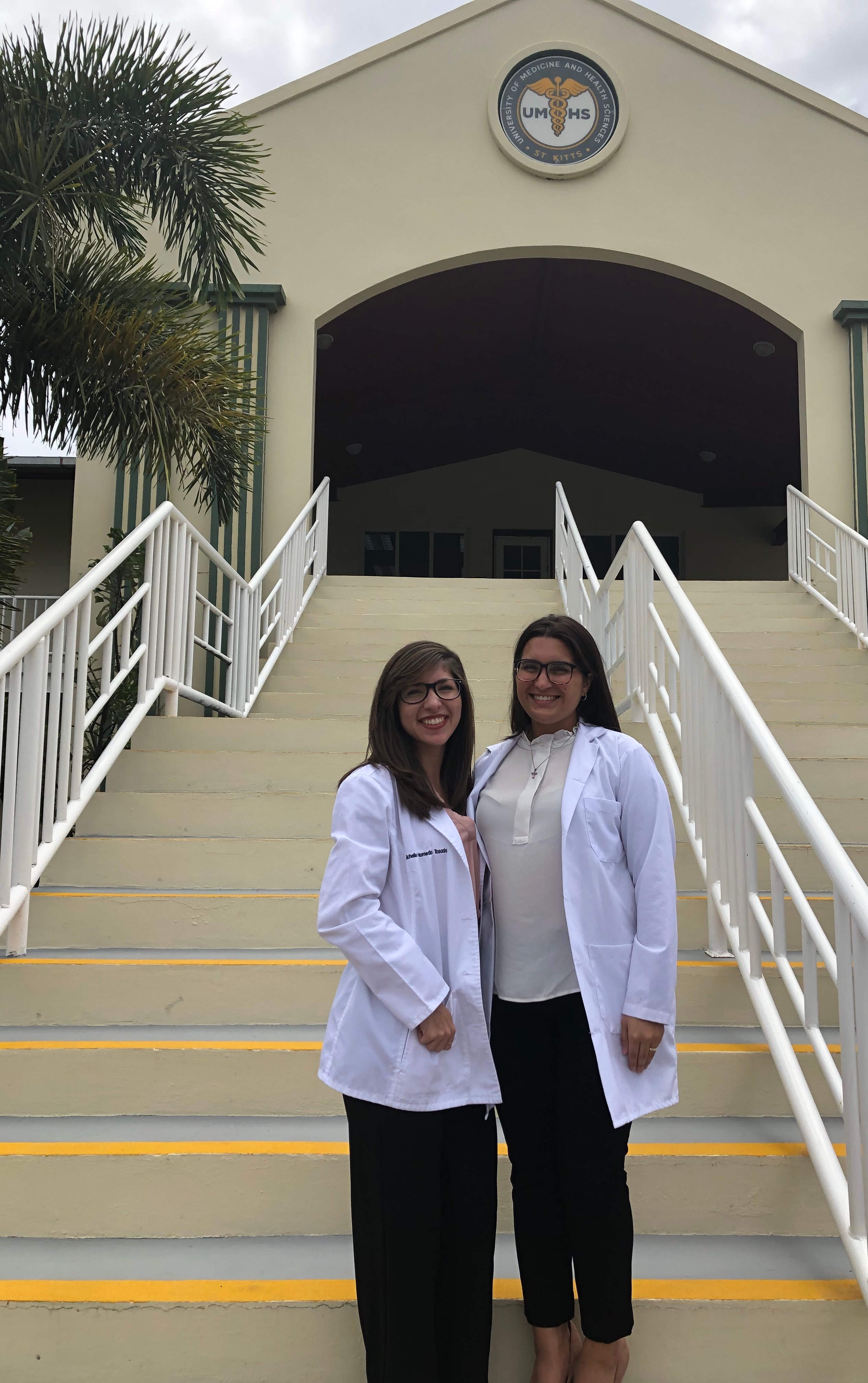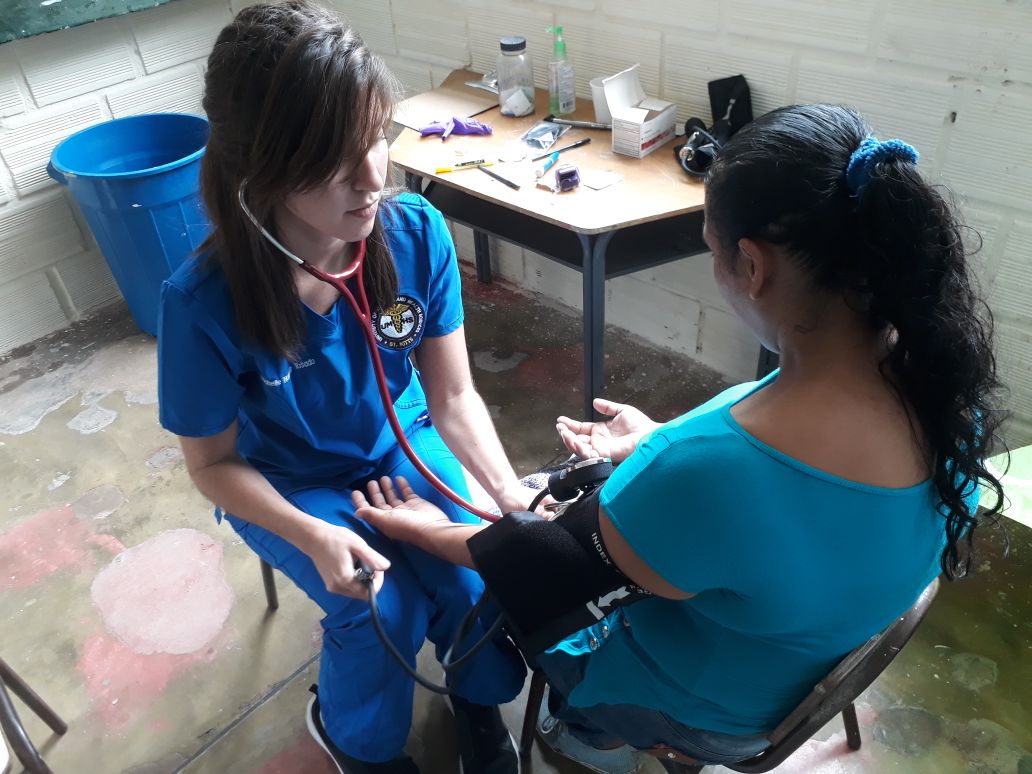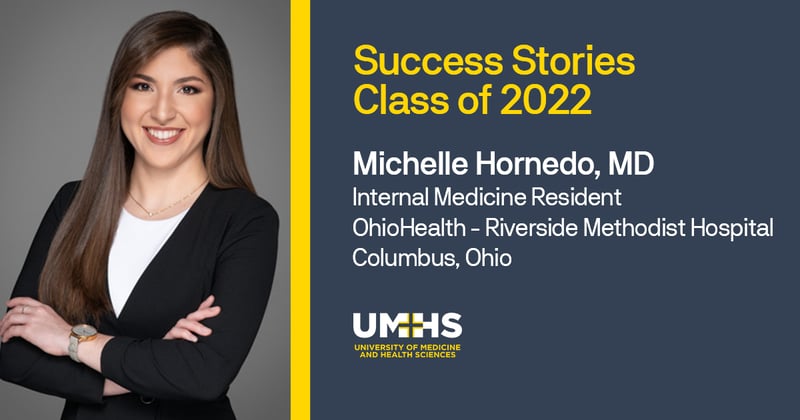Class of 2022 graduate Dr. Michelle Hornedo wanted to become a doctor ever since she was in kindergarten and liked to play with first aid kits and a toy stethoscope. The native of Puerto Rico starts an Internal Medicine residency at Ohio Health, Riverside Methodist Hospital in Columbus, Ohio.
The UMHS Endeavour spoke to Dr. Hornedo about her background, why she decided to become a doctor, her medical education at UMHS, her goals for her residency, advice for matching, and more.
 At-a-glance
At-a-glance
Free guide
Internal Medicine: Is it the right specialty for you?
- Future job outlook
- Salary & work statistics
- Subspecialties + advice from UMHS Alumni
Quick access. No spam. 10 pages.
Proud Puerto Rico native
“I was born and raised in San Juan, Puerto Rico where I've lived all my life up until my undergrad, which was at Penn State Behrend,” Dr. Hornedo said. “I've been fortunate enough to have amazing family support, obviously being from the Latin community, we're all very warm and welcoming, and it's part of what I want to bring into becoming a physician and being that way with my patients. Also, I'm just excited that I matched in Ohio Health, Riverside Methodist Hospital in Columbus, Ohio in Internal Medicine. I'm excited to meet new people and learn so much from all of my attendings and colleagues.”
Dr. Hornedo always wanted to become a doctor.
“I think even growing up my parents always say that's what I would always mention. You know how they ask little kids in kindergarten, what do you want to become? I would always say, I would want to become a doctor. I remember trying to play with the first aid kid, which wasn't an appropriate toy for a kindergartner, so my parents would actually get me some toy stethoscopes. It's been a long process, obviously, but it's been amazing.”
 Dr. Hornedo & Glorirma Urbino after the ICM presentations at UMHS in St. Kitts. Photo: Courtesy of Dr. Hornedo.
Dr. Hornedo & Glorirma Urbino after the ICM presentations at UMHS in St. Kitts. Photo: Courtesy of Dr. Hornedo.
Why UMHS
What made Dr. Hornedo choose UMHS over other medical schools?
“UMHS was very familiar and everybody was so warm and welcoming and like I said, it's part of how I was raised and my whole environment, being from Puerto Rico. I think that whenever I was in the interview that really came across, and not only that I had a really close friend from college actually—someone with whom I talked to prior to making my official decision. I remember we had a FaceTime call and I would just ask him all of these questions and everything that he told me was just about how much the professors had an open-door policy, how everybody was so willing to help you out through those topics that you were having some trouble with. I knew it was an environment that I was going to thrive in the long run. That, and the fact that I know, now graduating, I know that they have different or UMHS has so many great opportunities in different hospitals and you get to meet so many doctors and physicians that teach you so much from different perspectives. I think that's one of the main reasons.”
Faculty & staff that made a difference
Various faculty and staff helped make a difference for Dr. Hornedo.
“I can definitely think of various people that were helpful and inspiring, but I can say that [the late] Dr. Michael Doherty, may he rest in peace, was such an amazing doctor, and teacher, and also just as a person. Because I remember even just going to his office just to chat with him, even with my best friend, we were there all the time, even just talking about the specific topics that we were having some troubles with. One of the things that I really liked about him was the fact that he really believed in me as a student and he helped me grow and inspired me in that way.”
In addition, the Academic & Student Affairs Department in the North American Administrative Office in New York City was a big help for her.
“Someone else that I can mention is Associate Director of Academic & Student Affairs Jonathan Timen; he was amazing through the long process of an application. It's such a stressful moment for us as students. So, obviously having that support from him and him being so believing in me as well as a student and everything that I've accomplished was, I cannot speak the words, it's been amazing. Obviously, Patrick McCormick; he's also amazing in that process.”
 Dr. Hornedo takes a patient's blood pressure during an ISL Volunteer experience in Chinchina, Colombia. Photo courtesy of Dr. Hornedo.
Dr. Hornedo takes a patient's blood pressure during an ISL Volunteer experience in Chinchina, Colombia. Photo courtesy of Dr. Hornedo.
How UMHS helped her obtain a residency
Dr. Hornedo said UMHS helped her obtain a residency in many ways.
“I think there's so many aspects in UMHS that have really helped out through this process. I think one of the main things is we have so many opportunities to be in different hospitals throughout our clinical rotations. You don't realize this until you're there, but everybody has a different perspective on a specific topic that you personally might be having some trouble with. I remember the attendings giving me certain tricks of how to understand it in the long run and I'm going to have that whenever I'm a resident, whenever I'm an attending; that's what I'm going to be thinking of and what I'm going to be remembering. I think that just being able to go to different hospitals, learn from different physicians is one of the main things that has really helped me go into Internal Medicine and Match.
Internal Medicine residency in Columbus, Ohio
Dr. Hornedo is excited about starting her Internal Medicine residency this summer.
"Ohio Health, Riverside Methodist Hospital has the Internal Medicine program. It's a hybrid between an academic and a community-based hospital. They have such amazing opportunities with different electives; they really prepare their residents with the didactics of the ABIM exam. I really was drawn to them, not only because of everything in their curriculum that they offered to the residents, but also the fact that during the interview, they were very warm and welcoming and they were very open to talking about all of the topics and the things that they were willing to bring to the table when it comes to the residents and what they teach.”
What made Dr. Hornedo want to pursue Internal Medicine?
“One of the main things that drew me into Internal Medicine was the fact that as an internal medicine physician, you're able to see, in a day-to-day life, all kinds of different conditions and illnesses, that I personally, needed for becoming a physician. It's one of the things that, if I see one specific topic, I can see it in various days. For example, you go from cardio to gastrointestinal, to neurological, you can see all of these different things every day, on a day to day basis. An Internal Medicine physician is equipped with diagnosing them, creating a treatment plan for all of these illnesses, and you can also go into a subspecialty, you can do the Hospitalist route, you can become a primary care physician. The opportunities are really limitless because you can look at, if you want a sub specialize into a specific, let's say cardiology, like I mentioned, you can. It's something that drew me to it because the options are limitless, like I said.”
What interests her the most about Internal Medicine?
“ One of the things that really interests me is that I need to be able to see a little bit of everything every day. There's not one specific organ system that I can say I can live with the rest of my life, just talking about cardiology, I want to be able to just see everything, every day. That's one of the main reasons I chose Internal Medicine. Also the fact that, as an Internal Medicine physician, you work with so many different doctors from Neurology, Nephrology, and that teamwork is one of the things that I want to incorporate into my future as a career and as a physician. That's another thing that really drew me into Internal Medicine.”
Advice for the Match
Dr. Hornedo said it is best for students to follow the guidance of Jonathan Timen, Patrick McCormick and others in the UMHS Academic & Student Affairs Department regarding the Match process. Does she have any advice for current students?
“I say create your own study technique. I know that studying and taking USMLEs is a very stressful time; it's very scary to say the least. It's definitely something that you're going to hear a lot of opinions and resources from a lot of many different people. Just make sure that you choose the resources that work for you, create your own study habits, your own study techniques, to accomplish that goal. Also, work very hard in your clinical rotations because that is the moment where the attendings are going to see what kind of resident you're going to become. Work hard and show them what you can do on a day-to-day basis, that you know your material, that you are willing to put your foot forward into working hard.”
Goals for Internal Medicine residency
Dr. Hornedo has many things she wants to accomplish during residency.
“I want to be able to first learn more procedures and just be able to perform those, because I want to have that in the bag and also just be able to just absorb more knowledge from all of my attendings and colleagues, because I think that is going to be the moment where I'm going to choose whether or not I want to go into a subspecialty or to become a Hospitalist and go that route. I know for a fact, primary care isn’t in my track, but it's definitely something that I'm going to experiment with throughout residency. I'm just open to anything at this point.”
Work in Puerto Rico during COVID-19 pandemic
Finishing up medical school and clinical rotations during the COVID-19 pandemic was challenging, but Dr. Hornedo helped out in her native Puerto Rico.
“The COVID-19 pandemic really brought to light a lot of the day-to-day things that physicians have gone through and all of the sacrifices that we've put forth to be able to be where we are. I do think that it has been a crucial time and that it has been shown to the public. My COVID-19 pandemic experience was working on the National Guard Task Force in Puerto Rico and being able to see how much the physicians, the medical students, and even soldiers from the National Guard were all willing to put their lives at risk, to be able to help the public and the population here in Puerto Rico.
“It's not just the physicians that are important, I think that the healthcare system in general, there's so many people that play an integral part into helping the patients, helping the people with COVID-19, and also the patients because whenever we make the treatment plan, they're the ones that have to go through with it. It's all about working together to accomplish the goal.”
Puerto Rico has been through a lot in recent years, having survived the catastrophic Hurricane Maria and then COVID-19, but Dr. Hornedo said the indomitable spirit of the Puerto Rican people helped everyone get through the rough times.
“We're a very warm and welcoming environment and I'm not sure if everybody knows, but in Puerto Rico we kiss each other on the cheek and we are huggers and we've learned how to change that in order to help and our health when it comes to COVID-19. I think one of the positives is just the fact that we value our family and it's one of the moments where it really makes you think, I want to do this and I want to protect my family against COVID 19 and other people. Obviously we're still warm and welcoming, that hasn't changed, it's part of our culture. It's just about valuing more than we did before.”
Puerto Rico was one of the leaders in the Caribbean regarding COVID-19 because unlike other areas in the region, there was much less vaccine hesitancy and the local healthcare officials did an amazing job of just getting the word out about the vaccines and helping people during the worst of times.
“We've been lucky that everybody's been able to get vaccinated,” she said..” I think we're able to say that we've got one of the highest rates when it comes to vaccinations, so it's helpful in that regard. There's still obviously people out there that need to know the importance of vaccinations but at least here in Puerto Rico, we've been very good at getting to that goal.”
What have most med students learned from the pandemic?
“I think for med students, we've learned the mechanisms, we've learned how vaccines are manufactured, but now with the COVID 19 pandemic, we've seen the crucial conversations that we have to have with the patients of how important the vaccines are, and how they work, and explain to them what are the importance in regards to the consequences, meaning that it's going to be safer for us as healthcare workers, for the people around you, for your family members. Now as medical students, we can say we've seen this and we've been able to experience it firsthand, that maybe before we weren't as exposed compared to now, so it's good that we're able to actually say, okay, I know how to have this conversation with my patients.”
Words of wisdom for med students
Her final thoughts for current and prospective medical students?
“Just enjoy the ride as a medical student,” she said. “It goes by so fast; there are so many different opportunities that are going to be given to you as a UMHS student. So definitely take advantage of all of it, because in the long run you're going to learn and also it's going to help you for the Match, which is the goal.”
Dr. Hornedo encourages students to contact her with any questions about her experience.
“I have no problem with students reaching out to me. If there are any questions, I'm willing to help out anybody in that area.”
Email Dr. Hornedo at mhornedo@umhs-sk.net

Scott is Director of Digital Content & Alumni Communications Liaison at UMHS and editor of the UMHS Endeavour blog. When he's not writing about UMHS students, faculty, events, public health, alumni and UMHS research, he writes and edits Broadway theater reviews for a website he publishes in New York City, StageZine.com.

















